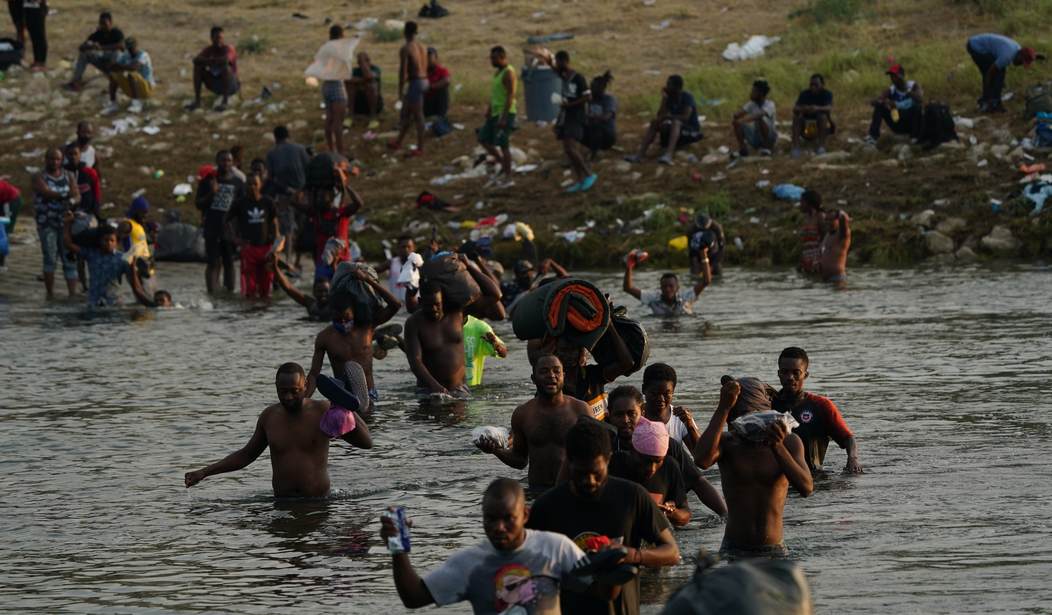There’s a new analysis piece up at CNN about the “radical shift” taking place at the border. That phrase comes directly from David Bier of the CATO institute who recently did a Twitter thread about it including some helpful graphs.
SW Border Patrol apprehensions, not from Mexico or the Northern Triangle are on pace to beat all prior records by a little bit. What's happening at the border is very new. pic.twitter.com/sU30my1fIj
— David Bier (@David_J_Bier) June 29, 2022
Bier argues that the “old playbook” won’t work in this new situation.
Here's what it looks like altogether. The idea that this situation couldn't continue for decades is naive at best. The best restrictionists can hope for is that another crushing recession with a terrible employment recovery will cut off demand for immigrant workers. pic.twitter.com/8BRMIpuzZ4
— David Bier (@David_J_Bier) June 29, 2022
In that final graph above, notice that the year 2000 was the previous historic peak and in that year nearly all of the migrants were coming from Mexico. There was a long slow decline after that but in 2019 we had what everyone at the time said was a “crisis” because the numbers spiked and many of the migrants were now coming from the Northern Triangle countries. Finally, look at the last two years and you’ll see how it dwarfs the scale of the 2019 crisis thanks partly to the addition of a new source of migrants.
US Border Patrol encounters still show more migrants from Mexico attempting to cross the Southwest border in July than from any other individual country. But so far this fiscal year, for the first time, encounters with migrants from outside Mexico and the Northern Triangle are outpacing encounters with migrants from either of those regions.
A handful of countries make up a large portion of this growing group at the border. The number of times US Border Patrol officials at the Southwest border encountered migrants from Cuba, Colombia, Nicaragua and Venezuela has increased dramatically over the past two years.
This creates a new “challenge” (the Biden admin. prefers that word) that other administrations haven’t faced. When the overwhelming bulk of migrants were coming from Mexico it was relatively easy to send them home. It’s just not possible to do that with migrants from Cuba and Venezuela because we aren’t on good terms with those countries and, frankly, people fleeing those countries probably have a better case for claiming asylum than most of the other migrants arriving at the border.
Doris Meissner, who directs US immigration policy work at the nonpartisan Migration Policy Institute in Washington, says the rise in additional nationalities at the border “makes border enforcement all the more complicated.”…
“These populations … require different kinds of responses,” Meissner says. “We have not established an asylum system that is in any way up to the level of the challenge that this change brought about.”…
An increase in Cubans making their way to the US, Meissner says, can be partially attributed to a new air route between Cuba and Nicaragua. CNN’s Patrick Oppmann reported that after Nicaragua dropped its visa requirements for Cubans, people began posting online ads selling their homes with “everything inside” to pay for the expensive airfare.
Deteriorating economic conditions, food shortages and limited access to health care are increasingly pushing Venezuelans to leave, and a growing Venezuelan community in the United States is also a draw, Meissner says.
Meissner says we need an overhauled immigration system, one that recognized most of the people coming here to claim asylum are not eligible But David Bier’s warning is the one that should have the Biden administration worried.
“It’s entirely plausible to think that this could continue for many years,” Bier says, “because we don’t have the infrastructure to expel people as fast as they come in.”
In other words, what if that chart above is really just the start of a new normal. We may get to the point where we look back on 2 million border encounters per year as the good old days. Texas and Arizona are going to be sending many bus loads of migrants to cities other than Washington and New York as a result. And that probably means a lot more blue state, sanctuary city mayors complaining bitterly about having to actually deal with this problem instead of just moralize about it.









Join the conversation as a VIP Member